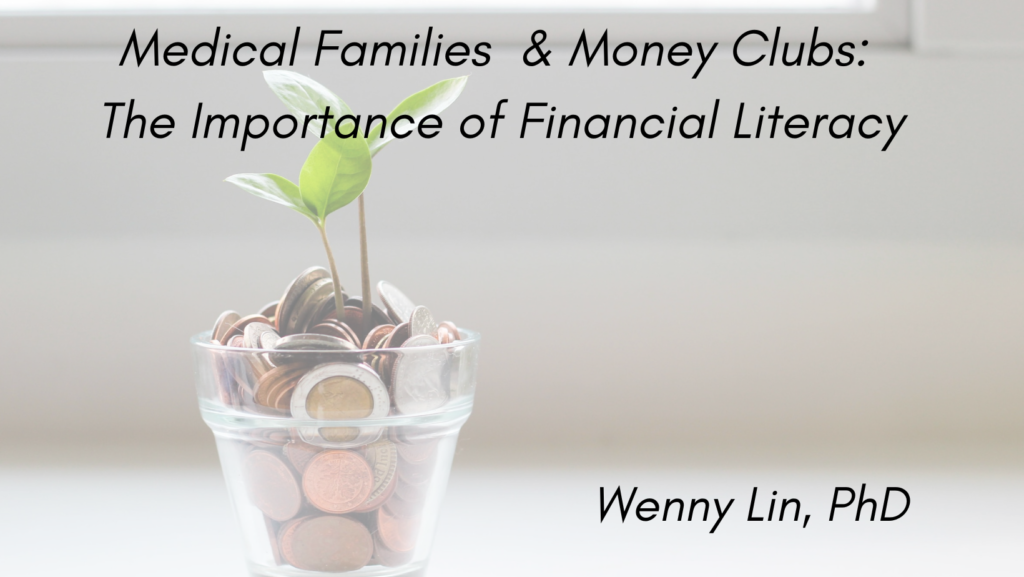We welcome back Wenny Lin, Ph.D. this month, who shares some wonderful ideas for all physician families, no matter where you are in the journey. Wenny is passionate about career development and personal finance topics, and she writes at Women in Pharma Careers. She is currently accepting invitations for “free” steak dinners.

My husband decided in his early 30’s to pursue medicine. On the outside, I tried to be supportive. On the inside, I was simultaneously reeling from the sticker shock of medical school tuition while wondering with anticipation that we might be in the top 1% of income someday (far, far away).
Most medical families in the US face unique financial challenges: the high cost of medical school, modest earnings during residency, and potentially high earnings once training is complete. These challenges can mean several years of surviving on student loans and public assistance. After that, financial advisors emerge aggressively to woo medical families with steak dinners and are eager to profit off their high income.
While my peers were saving for retirement and taking vacations, I was anxiously doling out the majority of my salary to partially fund medical school and our living expenses. I felt like we were going to be very behind our peers. How would we ever catch up?
When I shared my financial worries with some close friends, they weren’t sure how to advise me. We all realized that there was a lot to learn about personal finance. We decided to form a money club to get educated.
The importance of financial literacy
Financial literacy is the knowledge and capability to make sound financial decisions. Americans have historically scored pretty poorly on financial literacy, prompting many states to enact laws requiring personal finance courses be taught in schools.
Given their unique financial circumstances, medical families in particular would benefit from financial literacy. Oftentimes, medical families have questions like:
- How do we (and should we) refinance our student loans?
- How can we invest while also paying off loans?
- Is it worth paying the AUM (assets under management) fee to a financial advisor?
- Should we use a physician mortgage to buy a house?
- How much do we need to save so that we can retire – maybe even retire early?
- What kind of life insurance should I buy? What kind of disability policy?
Being financially literate means having personal finance knowledge. Some personal finance topics include budgeting, saving, investing, and debt management.
I recommend that medical families become financially literate well before the attending salary hits the bank account. However, it’s never too late to learn personal finance basics.
Even if medical families decide to hire a financial professional to manage their accounts, it’s always in their best interest to understand the advice or service they’re paying for. Remember: Nobody is going to care about your money as much as you do!
What is a money club?
A money club is simply a group of people who get together to learn about and discuss personal finance. Money clubs can help medical families become more financially literate and keep them accountable and responsible with their money.
Through regular money club meetings, medical families can learn the critical concepts of financial literacy and gain the tools they need to successfully manage their money. Some money clubs may even invite financial professionals to their meetings to educate them on certain topics.
Topics for discussion can include budgeting, investing, debt management, and retirement planning. Plus, money clubs with medical family members may tackle issues like employment contract negotiations, saving for relocation, tax strategies, and lifestyle inflation. Groups with children may share knowledge or experiences with saving for education.
In addition to fostering a supportive community where medical families can share their experiences and challenges, money clubs also provide medical families with the accountability needed to stay on track towards financial goals. Sometimes, we need a little coaching to ensure that we do what we said we would do!
It’s a bit like crowdsourcing personal finance information. The money club I belong to has tackled topics like salary negotiations, applying for a mortgage, and 401K employer matches. We meet monthly for dinner at my house and have continued to meet on Zoom during the COVID-19 pandemic.
Who should be in your money club?
A money club should have three to five people committed to improving financial literacy and striving toward financial goals. They don’t all necessarily need to be in the same stage of the medical training journey. Members also don’t need to be part of medical families, though similar challenges can help build camaraderie.
The important thing is to find people who are comfortable discussing money. Unfortunately, for many, money is a taboo subject.
Plus, money issues can be very intimidating or shameful. Therefore, being open to sharing and providing honest, empathetic feedback about money topics is a critical prerequisite for membership in any money club.
My money club includes friends from graduate school. We all work in different industries, and I am the only one with a physician as a spouse. In addition, we’re all in different personal situations, such as marital and parental status, homeowners vs. renters, etc. However, we are committed to finding and sharing credible information to collectively increase our financial literacy.
How to start a money club?
Being part of a money club is a great way to keep motivated and focused on your goals. It’s also like having your very own financial support group.
Money club members encourage each other through monthly meetings and regular phone calls or texts. They can meet at restaurants, in members’ homes, or online using messaging or web conferencing tools.
Starting or joining a money club is easy. Here are a few things to keep in mind:
- Choose a time and place for your meetings.
- Discuss the frequency of meetings and avenues of communication.
- Determine how agenda topics are selected.
It’s also important to establish some ground rules or guidelines for your money club. These could include:
- Confidentiality of private information shared within the money club.
- Respect for everyone’s opinions and ideas.
- Encourage a welcoming environment where everyone feels comfortable sharing.
- Hold each other accountable for the financial commitments made.
- Celebrate all the wins, big and small!
Building wealth with a money club
By learning and applying sound financial principles, medical families can optimize their money management and achieve the financial goals they set for themselves. This might mean paying off student loans early and building wealth to reach financial independence.
With the help of a money club, medical families can make informed financial decisions and overcome their challenges. Whether you’re in medical training or already established in your medical career, the support of a money club can help you succeed financially.
Since forming the money club with my friends, I’ve researched and purchased my husband’s own-occupation disability insurance. When our son was born, we made sure to have life insurance policies and our wills and estate planning documents. I’ve also focused on earning more money in my own career so that we can still have a high savings rate during parts of our medical training journey.
Resources
More about money clubs:
In addition, there are many free resources to guide you on your financial literacy journey. These include websites, social media, podcasts, and books. Here are some of my favorite resources to get you started:
- Nerd Wallet
- Financial Residency
- The White Coat Investor
- Wealthy Mom MD
- HerMoney
- How to Money
- Save My Cents
- Jill on Money
- NPR’s Planet Money
Conclusion
Money clubs are small groups of people interested in improving their financial literacy and keeping each other accountable to their financial goals. Medical families are often in unique financial situations, depending on the phase of training or career. Therefore, medical families may benefit from being part of a money club that shares financial knowledge and helps each other build wealth for the long term.

